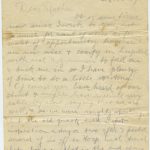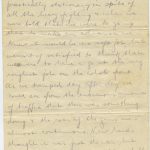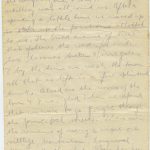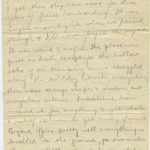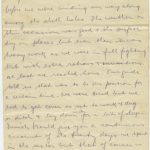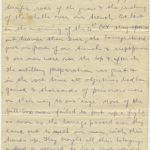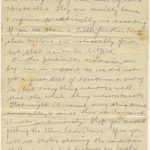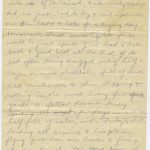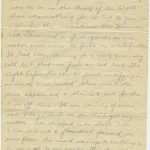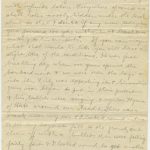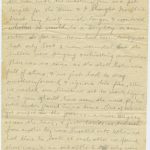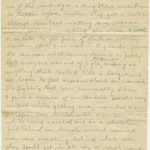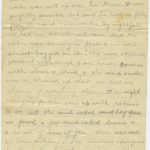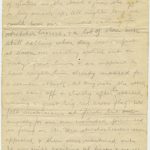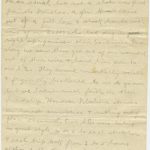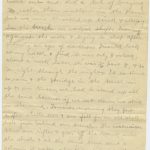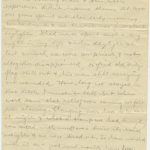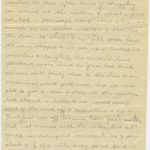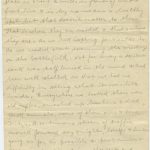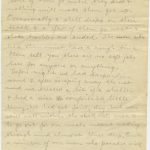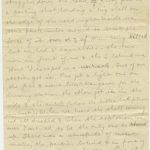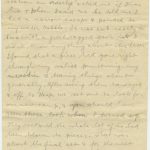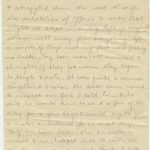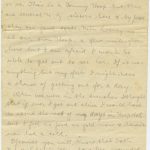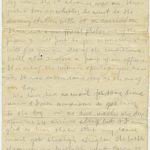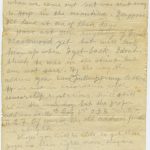No 7 General
France
28.10.17
Dear Mother
It is some time now since I wrote to you, not so much for want of news as for want of opportunity, however I am now nice & comfy in hospital with real N.Z. nurses to feed me & tuck me in so I have plenty of time to do a little writing. Of course you have heard of our stunt & might have received my cable by now saying that we are well, & so we were, roughly speaking, but the old quack held a foot inspection a day or two after & packed several of us off to Hosp with trench feet, however that is the end of my yarn so I had better start at the beginning. Ypres if course is the hottest sector
[Page 2]
on our front, it always has been & I suppose it always will be. For almost three years the line has been practically stationary in spite of all the heavy fighting & when we were told that we were to go up there to make an advance we knew it would be no soft job, but were sort of satisfied to think that were were to have a go at the very roughest job on the whole front. As we tramped day after day we could see from the enormous amount of traffic that there was something doing & the roar of the guns was almost continuous. New hands thought it was just the war but those who understood couldn’t help thinking. Our last route march along a broad well kept road almost choking with traffic, brought
[Page 3]
us within a short distance of Ypres. Fresh shell holes told us we were within the danger zone, & the rumble of artillery was all round us. After a spending a little time we moved up to take up the positions allotted to us. The broad avenue of trees that follows the road for miles, here becomes broken & irregular & by the time we reach the town all that is left is a few splintered trunks. Ahead are the ruins of the town & I was glad when we found that we were to go right through the principal streets. I have seen the remains of many a wiped out village, Montauban, Longueval, Messines & others but Ypres has been a large & well-built town, with its cathedral & famous Cloth Hall, but now it is a heap of bricks. Here
[Page 4]
& there just great shapeless pieces of wall straggle upwards for twenty, 30 or 50 feet, a touch would send them crashing & yet there they have stood for three years of fierce bombarding. It was bright moonlight when we passed through & I’ll never forget the sight. It was weird & awful. The place was quiet as death except for the hollow echo of our tramping as we straggled along the cobbley streets, everywhere there were strange shapes & shadows, and everywhere silence. I wouldn’t have missed it for anything, & yet what a relief it was to get away from it. Beyond Ypres pretty well everything is levelled to the ground, for two miles there is little grass to be seen between the shell holes, & a few trees still survive, but just there we come to the old British front line & from there
[Page 5]
forward all is a wilderness of mud. Roads are being formed as quickly as possible but it was not long before we were winding our way along among the shell holes. The weather on this occasion was good & the surface dry in places but even then it was heavy work as we were in full fighting kit with extra rations & munitions. At last we reached home. Our guide told us that was to be our position for a certain time. We were tired but we had to get cover so set to work & dug a ditch & lay down in it for a bit of sleep. I wish I could give you a continuous account of the twenty days we spent in the sector but that of course is forbidden so that I can just tell you a few of the experiences we enjoyed & leave the rest till I come home.
[Page 6]
Our artillery was doing great work at that time & several times a day would open out for an hour or so. We couldn’t hear ourselves speaking for the terrific roar of the guns & the rushing of the shells over our trench. At last on the morning of the 4th Oct they opened out heavier than ever, the barrage started just in front of our trench & crept forward & our men were over the top & after it. The artillery preparation was great & in the set time all objectives had been gained & thousands of prisoners were on their way to our “cage”. Most of the pill-box men failed to put up a fight as soon as the barrage passed over they came out to meet our men, with their hands up. They brought all their belongings & food & seemed to have just waited an opportunity to give themselves up. You don’t know what a lovely sight it is to see the miserable beggars filing
[Page 7]
back. They are thin faced & haggard looking with a fortnights growth on and nearly half of them wear big round spectacles. They are terribly tame & require practically no escorting. If you see them a little further back their buttons are noticeably fewer but that can’t be helped. On this particular occasion our Coy. was in support so we did not get a great deal of excitement out of it, but everything went so well that the whole thing was a cake walk. That night it rained every thing turned miserable, & since then it has rained almost continuously. I hope you are still getting the Illus. London News. If so you will see photos showing the condition of the ground, but pictures are lovely clean things compared with the real macKay. We shifted frequently & usually at night & every time we were landed
[Page 8]
in an unspeakable quagmire & told to make ourselves comfortable, which meant digging a trench & huddling into it. If it rained, & it nearly always did, we just had to try & coil up under our tin hats & hope for a drying day tomorrow. These moonlight flits would be great sport if we had a hot bath after being dragged out of half a dozen or more shellholes full of slush dead mules etc & then slipping & rolling in the mud every few yards, a fellow doesn’t fancy spending the next few days in a ditch half full of water, with Fritz’s shells landing all around & his planes flying just over heads & firing at our trench. Then when we felt that we
[Page 9]
had almost reach the limit of our endurance we got word that we were to advance again & this time our Coy. was to be in the thick of it. Well there was nothing for it but to give it a go. In the meantime the Tommies had advanced a few yards on our sector & we were to push on a bit further. It had been raining for a week & was very cold but that was just our bad luck. The night before the stunt found us digging in as usual & we “rested” there until the time appointed & then set out for the kick-off line. It was raining of course, cats & dogs, but we couldn’t get any wetter. We slipped into shell holes & crawled out & floundered forward, in some places up to our necks. This description, by one of the newspaper correspondents, is not far out:- “The one dominant factor of the day of course is the mud. On level spots on the low ground it is nearly semi-liquid slush knee deep or
[Page 10]
waist deep. In the drier places not actually flooded it is glue in which the men may not sink above their ankles, but out of which when once sunk in each foot is extricated only with infinite labour. Everywhere of course are shell holes mostly hidden under the level slime so that I doubt if any man today has gone forward 100 yds without at least once sinking to his armpits”. If you can imagine what that would be like you will have a slight idea of the conditions. It was just breaking day when our guns opened the bombardment & we were “over the bags” & into it. Fritz was expecting it & his machine guns soon began to put in their protest & his bullets were singing a regular Hymn of Hate around our heads. There was a crack near my ear & I looked round in time to see my bayonet fall to the ground, cut clean off with a bullet. Men were falling fairly fast & I looked round to get another bayonet when I saw my No. 1 man go down with a smack on the temple. He dropped the gun & went for his life. I threw away my rifle & picked up the gun & almost immediately
[Page 11]
there was a crack, & a bump on my right shoulder & a bullet had carried away the two legs of the gun, that reminded me that the man with the machine gun is a pet target for the Hun & I thought I couldn’t trust my luck much longer & wondered whether it would be a “Blighty” or an outer. So far our team had been lucky, we had only lost 2 men wounded, but the bullets were pinging & whistling everywhere. There was no cover as the shell holes were full of slime, & we just had to drag ourselves forward & ignore his fire. When we reached our limit we set to work digging in & you should have seen the mud fly. We were under ground into time. One of our men got swiped in the process – a nice Blighty across the back, & just beside us two men from another Coy were knocked out. When we had time to look at each other we found there wasn’t one out of the 6 who were left, who had not one or more bullet holes about his equipment. Bill Millar had carried his shovel on his back & a bullet went right through the handle of
[Page 12]
it & knocked a little piece of metal into his back, at least 2 bullets had cut across the top of his valise & another hit one of his pouches & exploded at least one of his cartridges, a thing I have never known to happen before. Another chap got a bullet through his boot making two separate holes without marking the skin. A week or so later he got a piece of shell on exactly the same spot & is now in England. Of course the rain was still coming down & as pretty well everyone was out of sight the Hun was sniping at anything that looked like a target and we began to feel anxious about our wounded. The fighting had been unusually fierce & quite a number of our Stretcher Bearers were sniped while getting away wounded & our skipper was killed with a sniper’s bullet while being carried out on a stretcher. Just behind our trench several wounded men were crouching behind what cover they could get in the way of rough ground. We did what we could for them, supplying them with water & cigarettes. One of them turned out to be a Tommy who had pushed through that far before being wounded & he
[Page 13]
had been lying there since their advance 4 days before. He had had nothing to eat or drink & was lying half in a shell hole with two dead men in the same hole & the water was well up over his knees. He was perfectly sensible but said he had no feeling from the waist downwards. By nightfall we had our trench well down but the water was coming up fast & we were almost bogged in it. We were absolutely plastered with mud & our hands covered with slush & blood, & the mud & water were so churned up that we had no chance of washing them. At night carrying parties came up with rations. As we cut the mud caked sand bag open we found a few mud caked loaves & a couple of tins of jam. That was our 24 hours rations. The carriers apologised for the water logged condition of the bread, they had tumbled into a dozen shell holes on the way up but it wasn’t their fault poor beggars. We knew
[Page 14]
that most of these shell holes held a dead Hun or two but we were hungry & it was as dark as the ace of spades so the bread & jam “etc” got a big smack-up. All night long we could hear our wounded calling for stretcher bearers, & a lot of them were still calling when day broke. Just at dawn our artillery opened out on Fritz’s front lines & are supposed to have caught him already massed for a counter attack. At any rate the attack never came off & shortly after he started waving a great big red cross flag. We felt suspicious at first but our anxiety for our own wounded prevented us firing on it. His stretcherbearers soon appeared & then ours ventured out. It was quite exciting at first & we all wondered what the game was but it turned out to be a dinkum armistice, & judging by the number of Fritz’s they carried out he needed it much more than we did.
[Page 15]
As the day wore on we got more faith in him & our chaps were wading about all over the show. The artilleries carried on as usual but not a shot was fired from the trenches. A few Huns came out of a pill-box & shook hands with some of our Battn who had dug in just right up against their barbwire. Further along we saw them get one of our wounded out of their wire & hand him over to our S.B’s. They seemed remarkably sociable & frequently beckoned to us to go over but we hadn’t much faith in their friendship. However I believe an honest armistice & nothing out of place occurred. Our S.B’s were toiling in great style 4 or 6 to each stretcher & each trip took 3 to 5 hours although the dressing station was only about a mile away. By night I think all our men were in, as well as several more Tommies who had been lying out.
[Page 16]
We were just about tired of the life & hoped for relief that night but were disappointed. After dark we went out and did a bit of burying rather than wallow in the trench but we were knocked up, tired & sleepy. In the trench we worked shifts leaning against the side & trying to sleep. After enduring an age of darkness I would look at my watch & find it was only 8 o’clock, about a “week” later it was 1/4 past 8, & so on right through the night. It continued to rain & the porridge in the trench was up to our knees, we had to stand up all the time because if we sat down we stuck in the mud. Towards morning they put a few shells over & one fell in an old shell hole just behind our trench. The concussion blew our rifles & gear off the bank into the slush & at the same time sent a column of water about 20 feet into the air. Of course it came down on top of us & drenched us. We shivered for a while but it washed a lot of the mud off and
[Page 17]
after all we were lucky to get off with a slushy bath. Our rifles were a source of worry. It was almost impossible to keep them in working order & this little experience didn’t improve them. At last our guns opened up their early morning bombardment & we knew it was just about daylight. I had never spent such a long night in my life & when daylight at last arrived we were surprised, & not altogether disappointed, to find old Fritz’s flag still out & his men still carrying out wounded. How long we stayed in that ditch I mustn’t tell but when word came that relief was coming we felt like cheering. Changing over had to be done at night & what a tramp we had. Everything was caked with mud & was twice its usual weight & we were tired out. To have marched with it on a good road would have been bad enough but to flounder along & grope our way through slush & shellholes seemed to be over the limit, but we were going out & that made a difference, and,
[Page 18]
just quietly, I wouldn’t like to be responsible for all the shovels, ammunition & gear that went missing before our destination was reached. At last after hours of struggling we arrived at the cookers & what a feed we had – porridge, soup, stew & tea – as much as we could swallow & then we lay down to sleep. Daylight soon came, the rain stopped & we got up & looked at ourselves & laughed. We couldn’t have plastered more mud on if we had tried. We were still fairly close to the line & an occasional shell fell near but we were able to get a rest & above all the weather had cleared a little & we could scrap some of the mud off & run about & get dry. Breakfast was off because our pack mules had not arrived with the water, but a N.Z. Y.M.C.A was dishing out backsheesh tea & stew about a 1/4 of a mile away so we paid it a visit. It is attached to a dressing station & was doing great work. Besides supplying the wounded, cigarettes & chocolate, tea, biscuits & stew were dish out to all & sundry. No charge
[Page 19]
is made & if a man is still hungry he is quite welcome to come the double. The Y.M.C.A. is the greatest success of the war. This place is about 2 miles in front of our old front line & is by no means a healthy spot but that doesn’t matter to them. That is where they are needed & that is where they are. As we had nothing particular to do we waded about examining the wreckage on the battlefield. Not far away a derilect tank was half buried in the mud & had been well shelled so that we had no difficulty seeing what it was like inside. Everywhere we looked there were old rifles, smashed up limbers & dead pack animals, some of them ours & some Fritz’s. A continuous stream of traffic moved forward day & night, lorries & limbers going as far as possible & pack mules & carrying parties doing the rest, and those poor mules, they are plastered all over in mud & never seem to get a spell. I have seen them go right up
[Page 20]
to their neck in shell holes, & that is how a lot of them finish. They get bogged & haven’t the strength left to get out. Some of them go until they drop & nothing will make them get up. Occasionally a shell drops on their track & a few of them go west & their troubles are ended. The men who lead them must have a rough time. I can tell you there are no soft jobs here for anyone or anything. Before night we had tarpaulins issued & after scraping away the wet mud we erected a bit of a shelter & had a nice comfortable little bivvy. We had got fairly dry but were still well within the shell hole area & to go out for our meals meant wading through mud almost knee deep. Quite a number of our men who paraded sick were sent away to Hosp. & Bill Millar was evacuated with the piece of shovel in his back. This left 5 out of 9 in our team. After a good spell here we were shifted
[Page 21]
further back still but it wasn’t bad going as they had pushed the road well up & we moved out in daylight. As we straggled down the road old Fritz put in a parting shot, landing a big shell on the edge of the road right beside us. Some pack mules seemed to break the force of it, two or 3 of them being killed but we had 5 casualties – the two men in front of me & the 3 behind me. How I escaped is a miracle. Two of our section got it. One got a light one on the face & went like a kangaroo for the dressing station the other got it in the side & the ankle (where the bullet had pierced his boot). When we heard the shell coming we all ducked & when the explosion was over I seemed to be the only one to stand up. There was a stampede of men & mules, the parties behind & in front of us were no where to be seen. Our S.B’s soon arrived & we got the wounded men bandaged & down to the dressing station. In the meantime another shell landed
[Page 22]
pretty near the same place but as we were all crouching down he hadn’t a big target & none of us landed it. At the station an orderly asked me if I was hit & when I said no he told me I had a narrow escape & pointed to my water bottle. It was cut neatly in two with a great ragged gash but I didn’t know anything about it. Later I found that a piece had gone right through my valice puncturing my mess tin & tearing things about generally. After seeing them bandaged & off to Hosp. we set out to look for our new camp, & you should have seen them look when I turned up. They reckoned the whole lot of us had been blown to pieces. That was about the final act & for the next few days we did little beyond a bit of salvage work & a days carrying for one of the batteries. At night he used
[Page 23]
to come over in his planes & drop a few bombs but never got close to us & then at last we packed up & straggled down the road through the outskirts of Ypres & out. That night we slept in a big loft full of straw well away from everything. After a couple of days rest my feet were getting no better. My toes were all numbed & at nights if they got warm they began to tingle & ache. It was quite a common complaint & when the doctor came round to inspect our feet I told him & he said he would have to send a few of us away for a few days & would try to get a motor ambulance for us next day. Half an hour later the ambulance arrived & we hopped into it with all our baggage & were off to Hosp. I felt a bit disappointed at the time but am just as well pleased now as I have had a good rest here & although
[Page 24]
they still tingle a little I hope to go to Convalescent camp tomorrow (30th) & should be back with the Coy. in a week or so. This is a Tommy Hosp. but there are several N.Z. sisters here & by jove they are good sorts. Min Looney is at our own Hosp. a few miles from here but I am afraid I won’t be able to get to see her. If it was anything but my feet I might have a chance of getting out for a day. When we were in the trenches I thought that if I ever got out alive I would have to spend the rest of my days in Hospital but I feel as good as gold now & haven’t even had a cold. Of course you will know that both Bob & Chris Millar have been wounded. Bob had only joined up a few days before. Mark saw Whistler MacGregor up near Ypres one day, he is in the Rifle Brigade. I have heard nothing of C. Hurley, T. Hickey or C. Reid
[Page 25]
since we came out but as far as I know they are all right. Fred Smith (Hamers’ cousin) got a very slight wound in the leg when the 1st advance was on. It was just a toss up whether he went to the dressing station with it or carried on. I have cut a few official photos out of the papers & will post to you separately. They will give you an idea of the conditions. Will also enclose a group of our officers. It is out of the Witness & perhaps you have it. It was taken same day as the one of our Coy. We have had no mail for some time now & I am anxious to get back to the Coy now as two mails are due. Your No 34 arrived along but I am glad to hear that my leave mail got through alright. The bottle of souvenirs probably went down as there was a parcel mail lost about that time, but it doesn’t matter much. I really thought the whole lot
[Page 26]
was gone. My trip to Paris has not come off yet. The stunt blocked me but I was recommended again when we came out but was sent away to Hosp in the meantime. I suppose I’ll land it one of these days. Have not seen anything of Ernie Blackwood yet but will look him up when I get back. I don’t think he was in the stunt but am not sure. By the way the address you have (are putting on my letters to is not in accordance with censorship regulations. I will still be in the same Coy. but the proper address is 14th Coy, 1st O.I.B., N.Z.E.F., B.E.F. Of course the old address finds me alright. I hope you will be able to get these pages in their right order, they are a bit mixed. Remember me to Port if he is still in the district, & to any other inquirers.
With Love to all
Len
